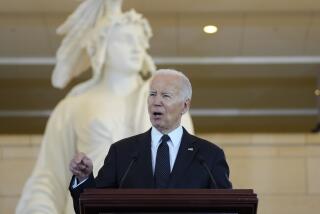DIPLOMACY : U.N.’s Zionism-Racism Stance Under Review
- Share via
UNITED NATIONS — Soundings are under way at the United Nations to determine whether the time has come for the General Assembly to repeal its controversial 1975 resolution equating Zionism with racism.
“The chances for repeal are better than at any time in the past,” said Edward C. Luck, president of the United Nations Assn. of the United States, a private group that watches U.N. issues closely. “One could say: If not now, when?”
Both American and Israeli diplomats are quietly talking with U.N. delegates to see if, in fact, repeal is possible. But they are cautious. “We will move only if we will be sure of a comfortable majority,” said Israeli Ambassador Yoram Aridor. “We will not take chances.”
Israel still does not know whether there is “a comfortable majority.” But it has been encouraged enough already so that “we are looking now into drafting the exact” wording of the proposed repeal, Aridor said.
Secretary General Javier Perez de Cuellar, though he will not say so directly, clearly believes in the need for the repeal. “It has always been my opinion that the resolution in some way . . . distorted the meaning of Zionism as it was conceived,” he has said.
The General Assembly passed the Arab-sponsored resolution defining Zionism as “a form of racism and racial discrimination” by a 72-35 vote with 32 abstentions on Nov. 10, 1975. The majority was made up mostly of Arab, African, Asian and many Latin American nations, including Mexico and Brazil. Sen. Daniel Patrick Moynihan (D-N.Y.), then U.S. ambassador to the United Nations, denounced “this infamous act.”
The resolution infuriated Israelis and other Jews. They regard Zionism as the historical movement to establish a Jewish homeland and the state of Israel as the culmination.
Strategists believe chances for repeal have improved because of the Gulf War and the new cooperation between the United States and the Soviet Union. Also, Israel has improved its relations with the Soviets, the former East Bloc and Africa.
Many Latin Americans nations, including Mexico, have acknowledged that they erred in supporting the resolution.
But there has been no hint of change in the Arab world. Most Arab delegates still refuse to refer to Israel in U.N. debates, calling it “the Zionist entity.”
Supporters of repeal are unsure how to proceed. Max Kampelman, head of the board of governors of the United Nations Assn. of the United States, said recently: “One can repeal it by an actual resolution. . . . One can repeal it in the form of another resolution, which implicitly repeals it and, therefore, saves the face of those who have been for it.”
Under this reasoning, a new General Assembly resolution that recognizes Zionism as a legitimate expression of the rights of the Jewish people might be regarded as an implicit repeal. But Arab nations might demand that any such resolution also recognize the right of Palestinians to their own homeland. Aridor, however, said, “We will not accept any rider that will diminish the effect of the proposed repeal.”
Still, Luck said, “The effort, I think, is extraordinarily important, both for the U.N.’s credibility and for moving the peace process in the Middle East, to make every effort to try to get this reversed or repealed or someway superseded.”
More to Read
Sign up for Essential California
The most important California stories and recommendations in your inbox every morning.
You may occasionally receive promotional content from the Los Angeles Times.













